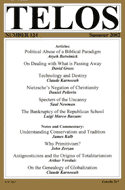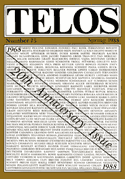By Telos Press · Thursday, March 6, 2014 Obama’s New Iran Policy and the Temptation of Appeasement
 A Presentation by Matthias Küntzel A Presentation by Matthias Küntzel
with an introduction by Charles Asher Small
Matthias Küntzel, author of Jihad and Jew-Hatred: Islamism, Nazism, and the Roots of 9/11 (Telos Press, 2008), will speak on “Obama’s New Iran Policy and the Temptation of Appeasement,” at Columbia University on Wednesday, March 12th, at 5:30pm. The event is being sponsored by LionPAC, the Columbia University Chapter of Scholars for Peace in the Middle East, and the Institute for the Study of Global Antisemitism and Policy. The location of the event will be Uris Hall, Room 141.
Continue reading →
By Matthias Küntzel · Monday, November 25, 2013 HAMBURG, November 24, 2013—During the night of November 24, 2013, it came to this: The five permanent members of the Security Council and Germany signed an interim agreement that accepts the plutonium facility at Arak and approves Iran’s continued uranium enrichment. “This deal appears to provide the world’s leading sponsor of terrorism with billions of dollars in exchange for cosmetic concessions,” criticized Senator Mark Kirk (R-Illinois).
Continue reading →
By Michael Millerman · Tuesday, July 16, 2013 As an occasional feature on TELOSscope, we highlight a past Telos article whose critical insights continue to illuminate our thinking and challenge our assumptions. Today, Michael Millerman looks at Luigi Marco Bassani’s “The Bankruptcy of the Republican School,” from Telos 124 (Summer 2002).
 Luigi Marco Bassani’s essay “The Bankruptcy of the Republican School” (2002) consists of an overview of the conflict in American historiography between two schools of thought. The first—Lockean liberalism—insists that America was founded on principles that recognize an abstract, natural right to life, liberty, property, and the pursuit of one’s private happiness. These natural rights are liberties that define a private sphere, to be protected from government interference. By contrast, the second school proclaims that not Lockean liberalism, but rather republicanism informed the Founders’ vision of what America is and should be. Republicanism elevates such notions as “the common good” and “the public sphere” above those of “individual liberties” and “private happiness.” Indeed, it can justify infringing on the latter for the sake of the former. Hence, it is in conflict with Lockean liberalism. Luigi Marco Bassani’s essay “The Bankruptcy of the Republican School” (2002) consists of an overview of the conflict in American historiography between two schools of thought. The first—Lockean liberalism—insists that America was founded on principles that recognize an abstract, natural right to life, liberty, property, and the pursuit of one’s private happiness. These natural rights are liberties that define a private sphere, to be protected from government interference. By contrast, the second school proclaims that not Lockean liberalism, but rather republicanism informed the Founders’ vision of what America is and should be. Republicanism elevates such notions as “the common good” and “the public sphere” above those of “individual liberties” and “private happiness.” Indeed, it can justify infringing on the latter for the sake of the former. Hence, it is in conflict with Lockean liberalism.
Continue reading →
By Robert Wyllie · Tuesday, June 11, 2013 As an occasional feature on TELOSscope, we highlight a past Telos article whose critical insights continue to illuminate our thinking and challenge our assumptions. Today, Robert Wyllie looks at Luciano Pellicani’s “Weber and the Myth of Calvinism,” from Telos 75 (Spring 1988).
 In his exchange with Adrian Pabst in Telos 162, Luciano Pellicani argues that the United States’ constitutional founding comes “in clear opposition to the theocratic model of the Puritan Fathers” (160). The Founding Fathers’ radical commitment to the Enlightenment, Pellicani claims, was the opening salvo in the contemporary culture war still raging in America. On one side there has always been the “commercial society ruled by a wealthy bourgeoisie” (155) aligned with the Enlightenment critique of religion (the deism of Paine and Jefferson) behind a secular constitution. On the other side is a populist religious opposition to the Constitution. The medieval and theocratic spirit of the Puritans, Pellicani explains, runs through the eighteenth-century Great Awakening all the way to the modern Christian Coalition. Pabst’s counter-argument proposes that Pellicani’s argument “is all too Protestant in its divorce of rationality from belief” (171). According to Pabst, Calvinism contributed decisively to the secularization of European society and the growth of North American capitalism (166). Pellicani’s hostility to this thesis has a long history in the pages of Telos. In his exchange with Adrian Pabst in Telos 162, Luciano Pellicani argues that the United States’ constitutional founding comes “in clear opposition to the theocratic model of the Puritan Fathers” (160). The Founding Fathers’ radical commitment to the Enlightenment, Pellicani claims, was the opening salvo in the contemporary culture war still raging in America. On one side there has always been the “commercial society ruled by a wealthy bourgeoisie” (155) aligned with the Enlightenment critique of religion (the deism of Paine and Jefferson) behind a secular constitution. On the other side is a populist religious opposition to the Constitution. The medieval and theocratic spirit of the Puritans, Pellicani explains, runs through the eighteenth-century Great Awakening all the way to the modern Christian Coalition. Pabst’s counter-argument proposes that Pellicani’s argument “is all too Protestant in its divorce of rationality from belief” (171). According to Pabst, Calvinism contributed decisively to the secularization of European society and the growth of North American capitalism (166). Pellicani’s hostility to this thesis has a long history in the pages of Telos.
Continue reading →
By Roger K. Green · Thursday, April 11, 2013 The following paper was presented at the Seventh Annual Telos Conference, held on February 15–17, 2013, in New York City.
 In Faith of The Faithless: Experiments in Political Theology, Simon Critchley writes: “What is lacking is a theory and practice of the general will understood as the supreme fiction of final belief that would take place in the act by which a people becomes a people or by which a free association is formed” (92). Critchley’s work turns to poetics or “making” as a mode of engagement and resistance for dealing with democratic-liberal crises. I suggest that psychedelic aesthetics and religion can provide a discursive ground for Critchley’s “supreme fiction” in the United States, because the making of the sacrificial figure in the psychedelic experience presents itself as capable of more ethically aware citizenship. A brief historical look at religions founded in the 1960s gives insight into the instantiation of a certain citizenship. In Faith of The Faithless: Experiments in Political Theology, Simon Critchley writes: “What is lacking is a theory and practice of the general will understood as the supreme fiction of final belief that would take place in the act by which a people becomes a people or by which a free association is formed” (92). Critchley’s work turns to poetics or “making” as a mode of engagement and resistance for dealing with democratic-liberal crises. I suggest that psychedelic aesthetics and religion can provide a discursive ground for Critchley’s “supreme fiction” in the United States, because the making of the sacrificial figure in the psychedelic experience presents itself as capable of more ethically aware citizenship. A brief historical look at religions founded in the 1960s gives insight into the instantiation of a certain citizenship.
Continue reading →
By Jeffrey W. Robbins · Friday, April 5, 2013 The following paper was presented at the Seventh Annual Telos Conference, held on February 15–17, 2013, in New York City.
 With the confirmation hearings of John Brennan as director of the CIA fresh in the news, who can doubt the accuracy, or at least the resonance, of Carl Schmitt’s conception of the sovereign—the sovereign is “he who decides on the exception.” With sovereignty so conceived, it has effectively been cast outside the law, introducing a certain arbitrariness and creating a legal limbo that undermine the principles of a liberal democracy. With the confirmation hearings of John Brennan as director of the CIA fresh in the news, who can doubt the accuracy, or at least the resonance, of Carl Schmitt’s conception of the sovereign—the sovereign is “he who decides on the exception.” With sovereignty so conceived, it has effectively been cast outside the law, introducing a certain arbitrariness and creating a legal limbo that undermine the principles of a liberal democracy.
Enhanced interrogation. Drone attacks on foreign soil. Targeted assassinations. And now, a 16-page white paper from the Department of Justice outlining the legal authority to kill a U.S. citizen without trial. In the words of the New York Times report, the legal brief “adopts an elastic definition of an ‘imminent’ threat, saying it is not necessary for a specific attack to be in process when a target is found.” It also asserts that the decision to kill is not subject to judicial review or restraint.
Continue reading →
|
|
 A Presentation by Matthias Küntzel
A Presentation by Matthias Küntzel  Luigi Marco Bassani’s essay “The Bankruptcy of the Republican School” (2002) consists of an overview of the conflict in American historiography between two schools of thought. The first—Lockean liberalism—insists that America was founded on principles that recognize an abstract, natural right to life, liberty, property, and the pursuit of one’s private happiness. These natural rights are liberties that define a private sphere, to be protected from government interference. By contrast, the second school proclaims that not Lockean liberalism, but rather republicanism informed the Founders’ vision of what America is and should be. Republicanism elevates such notions as “the common good” and “the public sphere” above those of “individual liberties” and “private happiness.” Indeed, it can justify infringing on the latter for the sake of the former. Hence, it is in conflict with Lockean liberalism.
Luigi Marco Bassani’s essay “The Bankruptcy of the Republican School” (2002) consists of an overview of the conflict in American historiography between two schools of thought. The first—Lockean liberalism—insists that America was founded on principles that recognize an abstract, natural right to life, liberty, property, and the pursuit of one’s private happiness. These natural rights are liberties that define a private sphere, to be protected from government interference. By contrast, the second school proclaims that not Lockean liberalism, but rather republicanism informed the Founders’ vision of what America is and should be. Republicanism elevates such notions as “the common good” and “the public sphere” above those of “individual liberties” and “private happiness.” Indeed, it can justify infringing on the latter for the sake of the former. Hence, it is in conflict with Lockean liberalism.  In his exchange with Adrian Pabst in
In his exchange with Adrian Pabst in  In Faith of The Faithless: Experiments in Political Theology, Simon Critchley writes: “What is lacking is a theory and practice of the general will understood as the supreme fiction of final belief that would take place in the act by which a people becomes a people or by which a free association is formed” (92). Critchley’s work turns to poetics or “making” as a mode of engagement and resistance for dealing with democratic-liberal crises. I suggest that psychedelic aesthetics and religion can provide a discursive ground for Critchley’s “supreme fiction” in the United States, because the making of the sacrificial figure in the psychedelic experience presents itself as capable of more ethically aware citizenship. A brief historical look at religions founded in the 1960s gives insight into the instantiation of a certain citizenship.
In Faith of The Faithless: Experiments in Political Theology, Simon Critchley writes: “What is lacking is a theory and practice of the general will understood as the supreme fiction of final belief that would take place in the act by which a people becomes a people or by which a free association is formed” (92). Critchley’s work turns to poetics or “making” as a mode of engagement and resistance for dealing with democratic-liberal crises. I suggest that psychedelic aesthetics and religion can provide a discursive ground for Critchley’s “supreme fiction” in the United States, because the making of the sacrificial figure in the psychedelic experience presents itself as capable of more ethically aware citizenship. A brief historical look at religions founded in the 1960s gives insight into the instantiation of a certain citizenship. 

